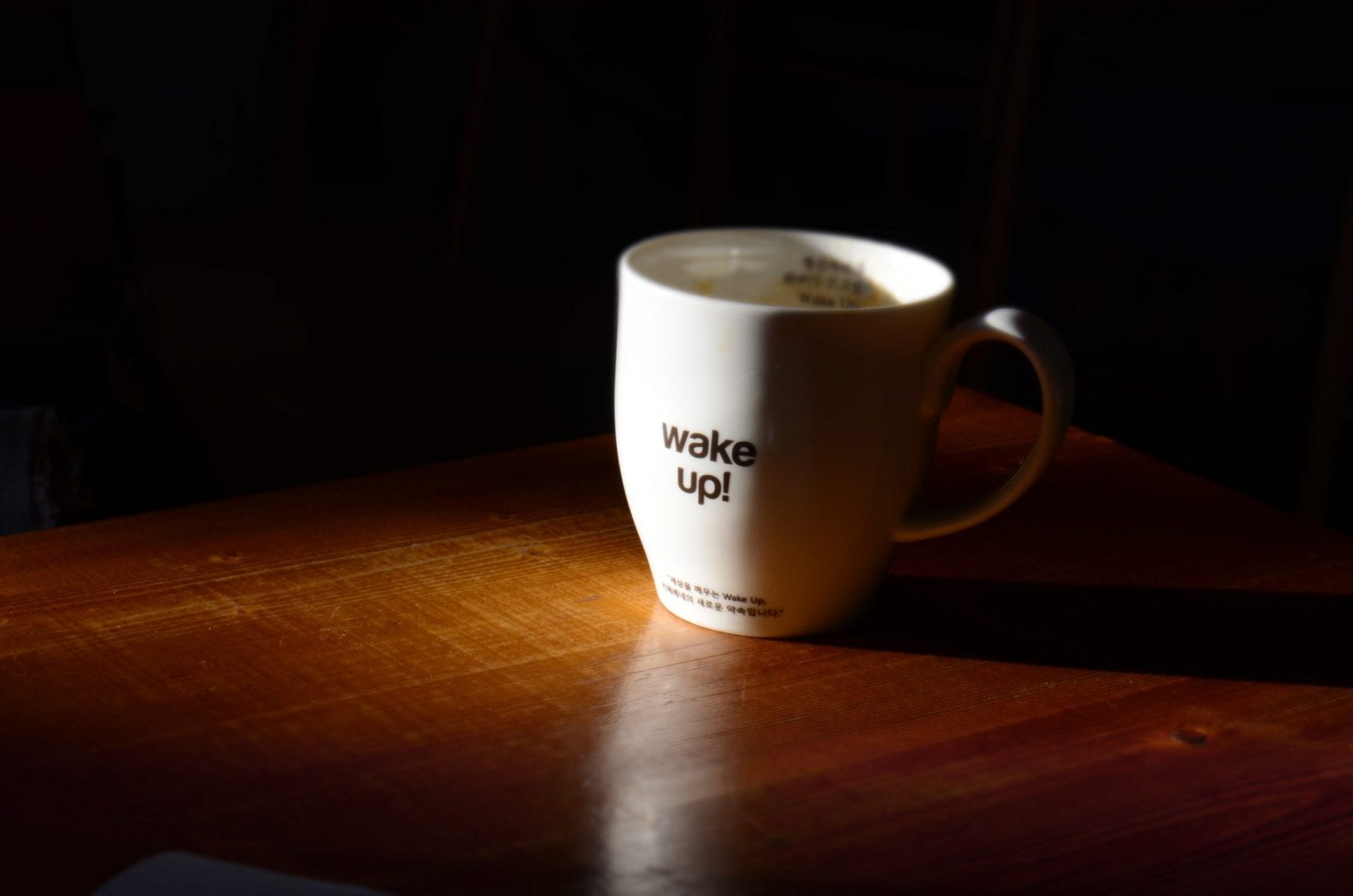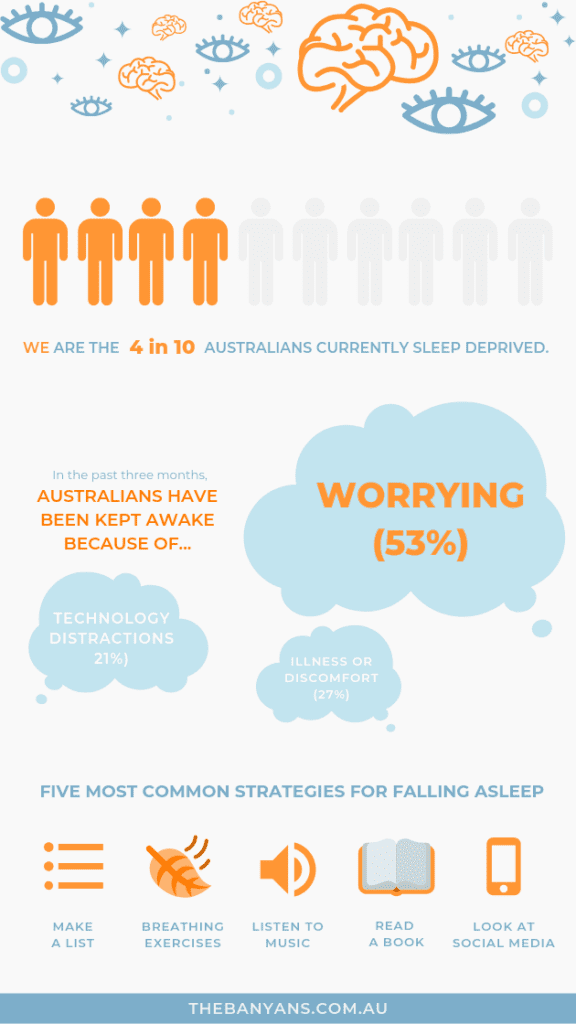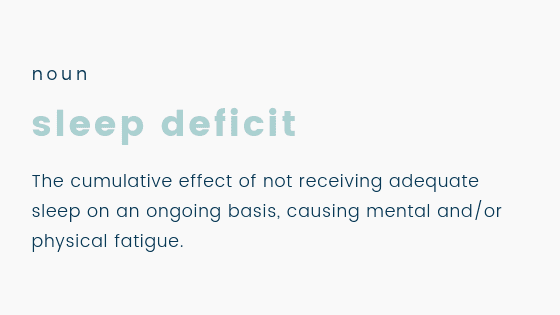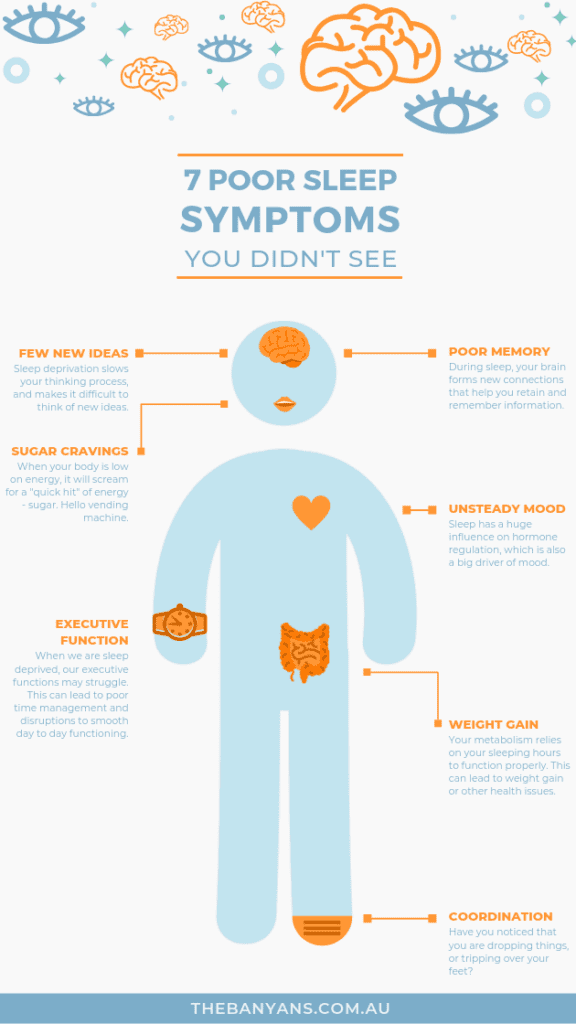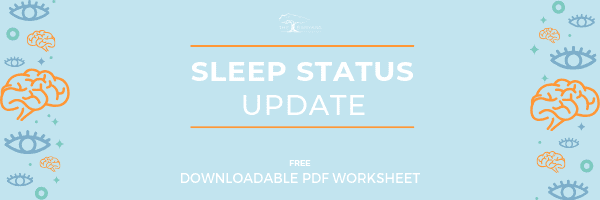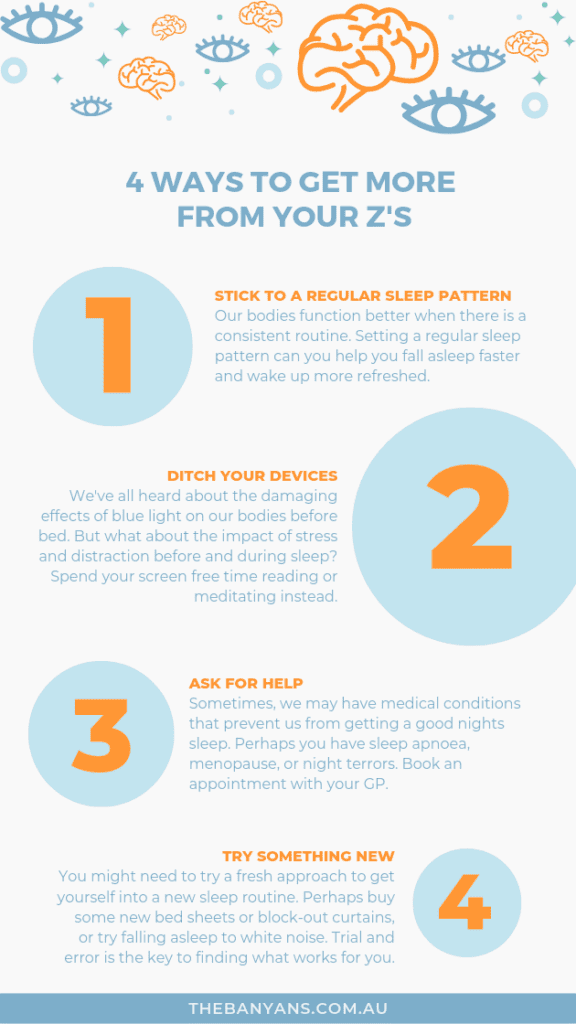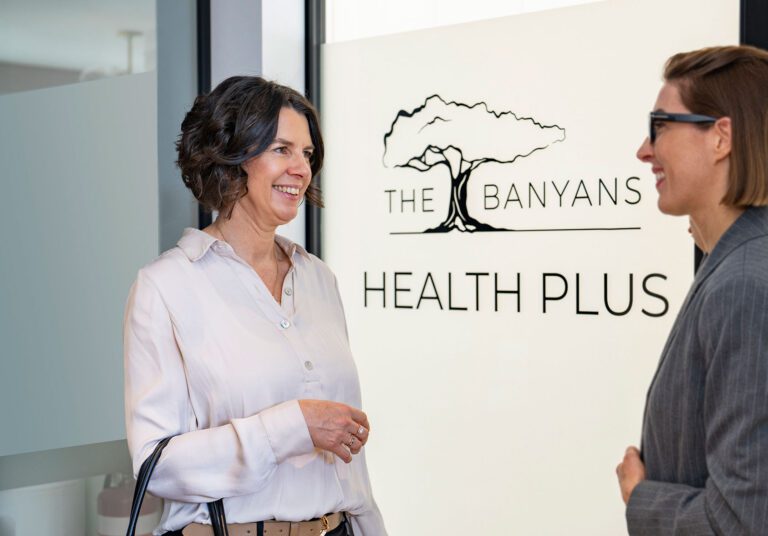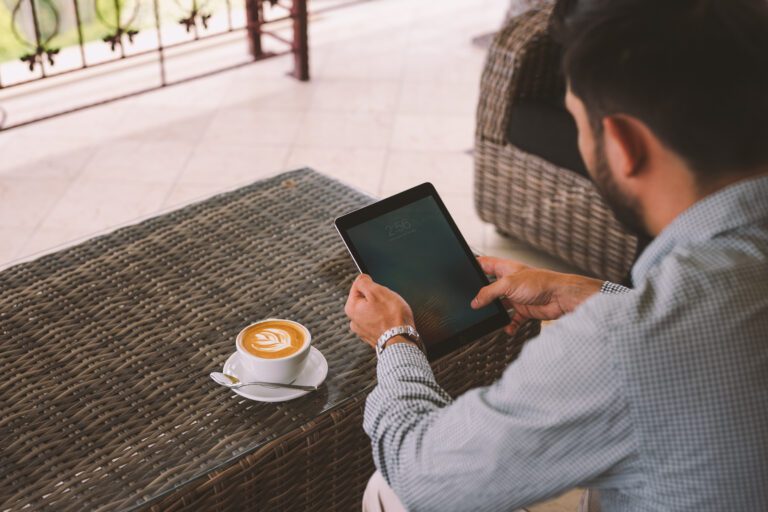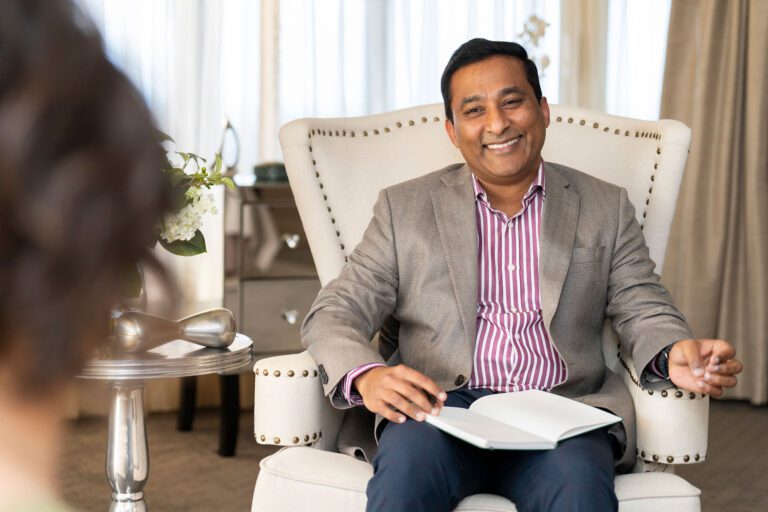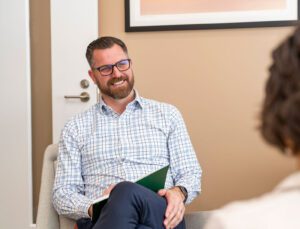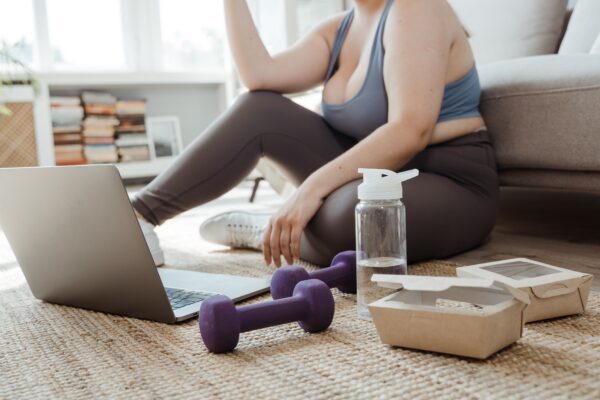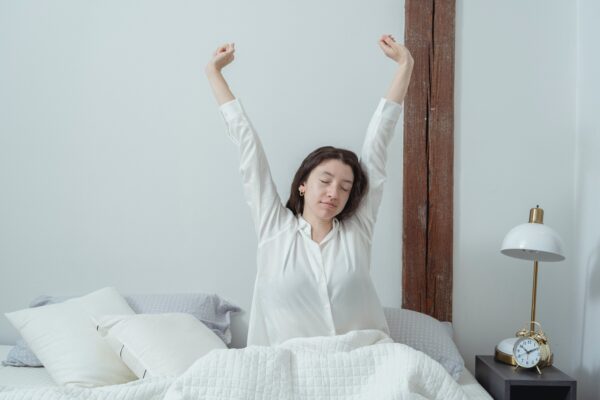
Did you know that 4 in 10 Australians are clinically sleep deprived? And although almost all of us would say that we could use a few more Z’s, only 63% of us have made an effort to improve our sleep life?
With Sleep Awareness Week occurring this August, The Banyans team have designed a Sleep Status Update, just for you!
Australian’s among some of the world’s most fatigued
Whether it’s falling asleep, staying asleep or waking up, Australian’s have some of the worst sleep hygiene habits, according to The Sleep Foundation, the official organisers of Sleep Awareness Week.
They suggest that approximately 53% of Australians have been kept awake at least once in the past three months due to worry, and a staggering 27% have missed hours of rest due to technological distraction.
Peter Hayton, the Clinical Director at The Banyans says that these statistics shouldn’t alarm most people. “It is normal to experience short seasons of disturbed sleep every once in a while, usually just a few evenings. Although you cannot make up for lost sleep, an early night or two generally helps you recover and restore a healthy sleep pattern.”
Peter suggests that sleeping issues becoming problematic when they are regular occurrences or we develop poor sleep routines. “This leads to sleep deficit,” he comments, “where ongoing sleep issues lead to mental or physical fatigue.”
New research connects genetic factors to sleep apnea
There has been plenty of research into sleep habits, circadian rhythm regulation and family predisposition. Peter suggests that looking to the sleep habits of your parents or grandparents may be helpful for those curious about what may work in terms of improved sleep.
“Although it is not necessarily guaranteed that you will inherent the same sleeping preferences or patterns as your parents, it is common that families pass on some sleep related traits,” he says. This is particularly relevant for those experiencing medical or physical sleep disturbances, like sleep apnea or snoring.
Alcohol is a Band-Aid fix that drives exhaustion, says psychologist
One of the biggest contributors to a poor night’s sleep is drug or alcohol use.
“Some people drink alcohol or use illicit drugs like marijuana for their relaxant or depressant qualities,” Peter observes. “They use these substances to cover other unpleasant emotions, thinking that the effects will help them fall (and stay) asleep.”
However, this is often a myth or a “band aid fix”, with alcohol and relaxant drugs often causing other issues that disrupt our health and wellbeing, including sleep.
“Alcohol causes dehydration, restlessness, and changes the natural cycle of the body to rest and wake. This is why people often feel “groggy” in the morning after alcohol.” Peter also highlights the “3am wake up”, in which those who drink alcohol in the evenings often wake up around this time. “It’s a very common yet unexplained phenomena.”
More common stimulants such as caffeine, sugary snacks or energy drinks can have similar disruptions on the sleep cycle. Peter reiterates advice to minimize caffeine intake in the afternoon and evenings.
The connection between sleep and poor mental health.
Peter Hayton says an individual’s sleeping habits may be one of the major drivers of poor mental health conditions.
“A consistent sleep life improves a person’s ability to manage psychological distress and emotional aggravation,” he comments. “When we are tired, we find it more difficult more difficult to process situations and our related feelings. This cycle may become overwhelming for some people, leading them to turn to substances or unhealthy behaviours to cope.”
A consistent sleep life improves a person’s ability to manage psychological distress and emotional aggravation.
Peter expands on this observation, explaining that “some mental health conditions, like depression, can cause someone to over or under sleep, continuing to drive the pattern of ill health.” Peter also suggests that other conditions, like the manic phase of bipolar disorder or anxiety, can make it difficult for a person to get ample rest – driving the cycle of emotional aggravation and psychological distress.
Sleep plays a big role in hormone regulation, which is also a significant driver of our mood. “We all know that we can be a bit irritable or grumpy when we are tired,” says Peter. “Some people become used to being sleep deprived, and rather than being grumpy all the time, they experience mood swings instead.”
The role of sleep in memory consolidation.
The theme of this year’s Sleep Awareness Week is Sleep on It: Memory and Problem Solving. Research suggests that sleep plays an important role in memory consolidation, meaning without a good night’s sleep, you’re probably not saving those precious moments in your long-term memory.
You might also notice that your concentration is shorter, you forget where you left things (Does “where are my keys?” sound familiar?), and you missed your anniversary. These types of working memories are a part of what is referred to as your executive function, and are degraded by a poor sleeping pattern.
Smooth sailing for the sleep satisfied: sleep improves executive function.
“Executive function describes how well you can use your ‘working memory’, or the active part of your brain,” explains Peter. “When you are sleep deprived, your executive function struggles. This affects your capacity to plan, anticipate consequences, and operate smoothly in your day to day life.”
Put simply: executive function determines your capacity to be aware of your present and future situation, and takes a hit when your body and mind is not given the opportunity to recover while you sleep.
Sleep is the key to problem solving.
The advice “Sleep on it” is actually scientific! A healthy night’s sleep has shown to play a significant role in improving problem solving, efficiency and facilitating creative thought – more elements of your executive function.
In an article by specialist neurologist Dr Fiona Kerr, she explains that a 20 to 30 minute nap in the day has been shown to clear “the inbox of your brain”, giving you more space to process complex challenges and come up with new ideas.
Sweet tooth or sleep deprived? The connection between sugar cravings and sleep deficit.
Lisa Cutforth, Clinical Nutritionist, explains that when we are tired and fatigued, our body will scream for some energy to keep us going. “We call these screams, cravings.”
The fastest way to get that hit of energy? “Sugar,” Lisa suggests. “Unfortunately, you will likely crash just as fast, and end up feeling more tired than before.”
If you are finding yourself reaching for the cookies, chocolates or even fruit, it is likely that your body is also asking you to reach for a pillow and get some more sleep.
Give your body a head start: the benefits of sleep for your physical health.
Ryan Barber, the Exercise Physiologist at The Banyans, describes the role of sleep in weight management: “Sleeping is the time when your body resets your metabolism and catches up on digestion. If you are not giving your body the time it needs to do this properly, it’s likely your putting on a few extra kilograms. Your body also needs time to heal and rebuild your cells, which is a key part of effective weight loss and muscle recovery.”
Fatigue is a key factor for your fine motor skills.
Similar to the effect sleep has on memory and concentration, your fine motor skills and general coordination struggle when you are sleep deprived. Unfortunately, this often means you are more accident prone, and may need to be especially careful.
To help you take a Sleep Status update, The Banyans have created a free downloadable quiz, just for you. Answer these seven questions as truthfully as possible, add up the points, and see how you score.
Quality over quantity: how to get more out of your sleeping hours
Peter Hayton encourages people to consider more than just the number of hours when it comes to evaluating your sleep health. He informs that “there are many factors contributing to a healthy sleep life, which is why we created the Sleep Status Update.”
He says that some of the best minds in the world operated on less than eight hours, but this “definitely is not the advice for everyone.”
Peter suggests using a sleep tracking device, like a FitBit, Garmin or Apple Watch to get some additional insight into your sleep quality, not just quantity.”
It is important to remember that these devices work on sound and movement, and do not replace a medical sleep study. Peter highlights that “these devices can be great starting points for your curiosity, but you should visit your GP if you are genuinely concerned about your sleep life.”
With only 63% of Australian’s making intentional efforts to improve their sleeping habits, The Banyans has put together four easy ways you can get more from your sleeping hours.
1. Stick to a regular sleep pattern.
Our bodies function better when there is a consistent routine. Setting a regular sleep pattern can you help you fall asleep faster and wake up more refreshed. Peter weighs in, saying:
“Our bodies naturally move through both sleep cycles and wake cycles. During the wake cycle, our body produces melatonin in response to sunlight. When we wake at a regular time, our body shifts the cycle to more naturally align with our exposure to sunlight.”
In addition, humans are naturally creatures of habit. Peter advocates for a relaxing pre-sleep routine for those looking to easily improve their sleep life. “There are lots of ways we can relax before we go to bed: perhaps a warm shower or face wash, reading, meditating, listening to calming music, or bedtime yoga stretches.” He affirms the importance of relaxing pre-bed activities, and encourages people to seek digital free options.
2. Ditch your devices.
Peter also acknowledges that some digital devices, especially those with LED screens, can mimic sunlight, and disrupt the production of melatonin in the evening. This can make it difficult for our bodies to feel tired when we are wanting to go to sleep.
Moreover, we’ve all heard about the damaging effects of blue light on our bodies before bed. But what about the impact of stress and distraction before and during sleep?
“Some people may struggle to fall asleep because they have seen something stressful or upsetting just before they go to bed,” Peter highlights. “We should be trying to clear our minds before we sleep, not filling them with stressors from emails or social media.”
Peter encourages at least half an hour of screen free time before bed. “This half hour is a great time to apply the sleep routine we spoke about earlier, and spend time relaxing or meditating before sleep.”
3. Ask for help.
Do you snore, toss and turn, or wake up a lot throughout the night?
Sometimes, we may have medical conditions or physical circumstances that prevent us from getting a sufficient, good quality rest. Perhaps you have sleep apnoea, menopause, or night terrors. “Sleep tracking devices or even an app can help you detect these sort of physical patterns, however it’s best that you book an appointment with your GP if you think this might be something worth investigating,” reminds Peter.
He also recommends some excellent books on sleep hygiene that you may find beneficial. “The Sleep Book by Guy Meadows is a great resource for anyone who is considering the struggle we often have with poor sleep. I would also recommend Sleep Smarter by Shawn Stevenson – it talks about sleep factors that can help you improve your long term sleeping patterns.”
Peter comments on the importance of sleep patterns throughout a program at The Banyans Health and Wellness. He observes that “many people benefit in the early weeks of their program, when their psychiatrist, psychologists and wellness coaches encourage guests to develop healthy sleep patterns.” The comprehensive approach of medical therapies, natural approaches and social support, as well as the digital detox phase helps build healthy sleep patterns well before guests leave The Banyans. “This allows these patterns to be continued once a guest returns home again.”
4. Try something new.
Is the same old routine just not good enough anymore? You might need to try a fresh approach to help yourself obtain a new sleep routine or more comfortable environment. Perhaps buy some new bed sheets or block-out curtains, or try falling asleep to white noise or calming music. Trial and error is the key to finding what works for you.
Still want some more tips? The Banyans Health and Wellness has written a few blogs on sleep and hygiene – make sure you check them out!


